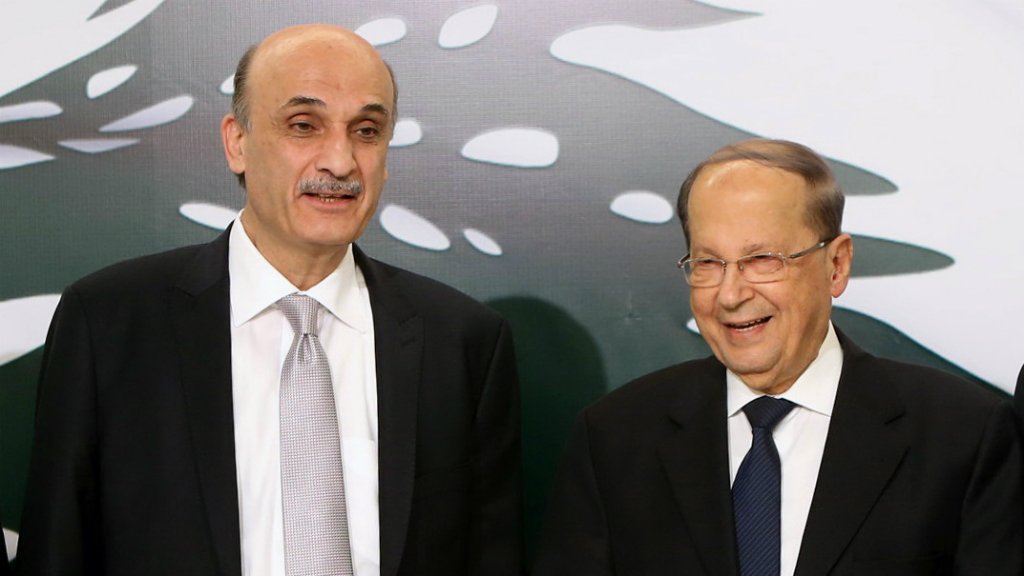Beirut – The main issues that produced the alliance between the Lebanese Forces and Free Patriotic Movement have not changed in the year since the two sides signed their “Declaration of Intent,” but their stances on internal and regional affairs have shown the major differences between them.
The LF and FPM signed in 2016 the “Maarab Agreement” that put an end to the long history of disputes that go back to a quarter of a century, but differences have emerged between the two parties on Lebanon’s electricity file and “Hezbollah’s” possession of arms.
The FPM believes that the weapons are integral and complementary to that of the army, while the LF deems them as illegitimate and a blow to Lebanon’s sovereignty, because they serve a foreign agenda and are controlled by Iran, not the Lebanese state.
Despite the public statements by officials from the LF and FPM that the gap between the parties is growing, the two sides insist on cementing their agreements and asserting that any difference will not shake their alliance, which is based on solid national and Christian grounds.
FPM official and former Minister Mario Aoun told Asharq Al-Awsat: “The ties between the LF and FPM are solid and strong and they will not deteriorate by those seeking to sabotage them.”
He remarked that communication is ongoing between the two sides as demonstrated by the visit LF chief Samir Geagea paid to Lebanese President and FPM founder Michel Aoun at the Baabda Palace.
“There is no doubt that the electricity file is a thorny issue and that our approach differs from that of the LF. We refuse to sell this rich sector to the private one, which will be able to control people’s lives,” explained Mario Aoun.
“We have no problem in allowing the private sector to take part in producing electricity, but we reject the total privatization of the field, especially since we have reached an advanced stage in productivity and activating this public utility,” he continued.
“The problem does not lie in the sector, but in the need for administrative reform.”
Meanwhile, Geagea’s advisor on presidential affairs, Wehbe Qatisha, made light of the LF-FPM disputes over internal affairs, stressing however to Asharq Al-Awsat “the need for a radical solution to the electricity crisis that has drowned the state treasury in debt.”
“We have a plan to privatize the power sector in participation with the state so that it can turn into a profitable field,” he revealed.
On Sunday, LF MP George Adwan stated that a meeting was held recently between ministers concerned with the electricity file in order to clarify the LF proposal in this issue and bridge the gap with the FPM, saying they are close to reaching an agreement.
As for the parliamentary elections, the MP noted: “Along with the FPM, we agreed on more than one draft-law and coordination was ongoing between us the whole time.”
Some sides however are more “sensitive” to this issue than others and they should work on easing them, Adwan remarked.
Mario Aoun admitted that the LF and FPM favor different electoral laws, telling Asharq Al-Awsat: “We submitted the Orthodox draft-law (where each sect elects its own MP) and the LF submitted the hybrid law (that combines elements from the winner-takes-all and proportional laws). We made concessions towards the hybrid law, but some sides do not know what they want.”
“Whenever we reach a certain solution, they come up with problems to hinder it,” he lamented while urging some sides to “abandon their selfishness.”
Qatisha meanwhile spoke of the “constant discussion with the FPM over the electoral law, where we sometimes agree and sometimes differ on many issues, but we will not spare an effort to reach common ground.”
“The central issue of contention with the FPM is its view on ‘Hezbollah’s’ weapons,” he explained.
He voiced the LF’s rejection of President Michel Aoun’s declaration that the weapons complement those of the Lebanese army, saying: “The military is strong through the people’s support and it is capable of defending Lebanon.”
“The alliance between the FPM and ‘Hezbollah’ does not bind the LF and the speeches of the group’s leaders, the latest of which was that of its Secretary General Hassan Nasrallah. His verbal attack against Arab countries target Lebanon at its core and harm the interests of all Lebanese,” he stressed.
“We are part of the Arab world and our vital interests pass through the Gulf countries. We will not support those who harm Lebanon’s ties with these nations and we are counting on them returning to their senses,” Qatisha said.
